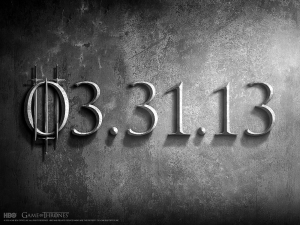
Whether written or read, every book is a lesson.
George R.R. Martin is one of the best I’ve ever learned from (and for more than just his gratuitous descriptions of food). GRRM’s writing has made an indelible impact on mine. So today, I’d like to share some of my favorite lessons with you.
(Be forewarned—there will be spoilers for his books!)
Lesson 1: It’s Good to Bully Characters
Though I’ve covered this subject before, it remains a tough lesson to internalize. Yet the truth is plain: It pays to be mean to your characters.
Nobody’s nastier than George R.R. Martin. He beheads poor Ned Stark in book one, murders Renly Baratheon in book two, then goes ham in book three by killing Catelyn Stark, Robb Stark, Joffrey Baratheon, and Tywin Lannister (among others).
And those are just the characters who die. The ones who live fare little better, i.e. Jaime Lannister getting his hand lopped off, Bran Stark being tossed from a tower, Daenerys Targaryen losing her son and hubby within hours of each other, and so forth.
I am almost certain Martin likes all these characters (with the exception of Joffrey). Yet he still bullies them. It’s the right thing to do.
Imagine, for example, if Martin liked Robb Stark too much to have him killed at the Red Wedding. Doing so would deprive us of one of the most shocking plot twists in modern literature—and television, for that matter. (I remember when the Red Wedding episode of HBO’s Game of Thrones aired. People could not stop talking about it.)
Bullying one’s characters means putting them in difficult situations. This forces one’s characters to be clever, courageous, and resilient; in short, it makes them more interesting. The meaner the writer is, the more momentous their characters’ eventual triumphs will be.
Lesson 2: Plan Ahead
As a kid, I dreamed of writing series. I dreamed of trilogies, quartets, quintets, whatever you call a six-book series, and more. Martin’s A Song of Ice and Fire is a planned seven-volume series, and it’s masterful.
Before anyone writes an angry comment, let me clarify. Martin’s series is masterful. His writing pace? Not so much.
But part of what makes the five existing books so compelling is their foresight. The more you read, the more you’ll notice that those vague prophecies and ethereal dreams always seem to come true. That’s because Martin plans ahead, and has a destination in mind.
Consider this passage from Catelyn Stark’s point of view in A Game of Thrones:
“Sometimes [Catelyn] felt as though her heart had turned to stone…”
An innocuous line when you first read it. Yet once we get to book three, when the Freys murder Catelyn and Beric Dondarrion resurrects her, she goes by a new name: Lady Stoneheart.
And that’s just a subtle example. Adding these nuggets throughout the series makes the books feel even more intertwined and interconnected. Plan ahead and reap the rewards.
Lesson 3: A Good Mystery Goes A Long Way
I’m not much of a mystery reader, but I probably should be. I always enjoy books with even a hint of the unknown. Martin has those hints in spades.
There’s the classic R + L = J equation, a long-standing theory which I won’t spoil for readers (but was confirmed in the series). Also, what the heck happened to Benjen Stark, who went ranging in the wild in book one and never appeared again? And what game are Illyrio Mopatis and Varys playing together?
I’ll stop there to preserve my word count. But you can visit the long-running Forum of Ice and Fire or the series’s Subreddit for more mysteries and possible explanations. If a series has enough enigmas to fill two websites with content, you know it must be special.
Lesson 4: Perfection is an Illusion
In second grade, I decided I wanted to be a writer. Fantasy was my genre, chiefly inspired by The Lord of the Rings. I loved the trilogy, yes—but part of me resented it as well. I’d convinced myself that no one—particularly me—could ever write anything better.
Then, 10 years ago, my dad invited me to watch a show I never heard before: A Game of Thrones. He’d heard about it somewhere and knew how much I loved LOTR. So, we watched the pilot. (Not really the type of show you should watch with a parent, but so it goes.)
Here’s a short list of the things I witness on my first visit to Westeros:
- Nudity
- Incest
- Attempted child murder
- Several creative uses of the word “fuck”
- Characters who aren’t clearly good or evil
What blew me away was the audacity of the story. Game of Thrones took epic fantasy, a genre that celebrated heroism and the triumph of good over evil, and turned it into something far uglier—and in many ways, more compelling.
I spent the summer of 2011 watching new episodes every Sunday. The other six days of the week were spent tearing through the novels. And though it didn’t come immediately, I eventually had an epiphany: I liked A Song of Ice and Fire better than Lord of the Rings.
When you see perfection improved upon, you realize nothing’s perfect. There’s always more to be done, a higher place to climb, a better book to write. GRRM’s work helped me see past the ceilings I’d always believed were there. I doubt I’ll ever write anything better than Lord of the Rings. But if Martin could do it, it can’t be impossible.
Thanks, GRRM
Though we’ve never met, I’ve learned so much about writing from George RR Martin. I hope you did as well.
Kyle A. Massa is a speculative fiction author living somewhere in upstate New York with his wife, their cats, and their dog. He has written two books and numerous short stories, both published and yet-to-be published. He enjoys unusual narrative structures, multiple POVs, and stories that make readers laugh.








